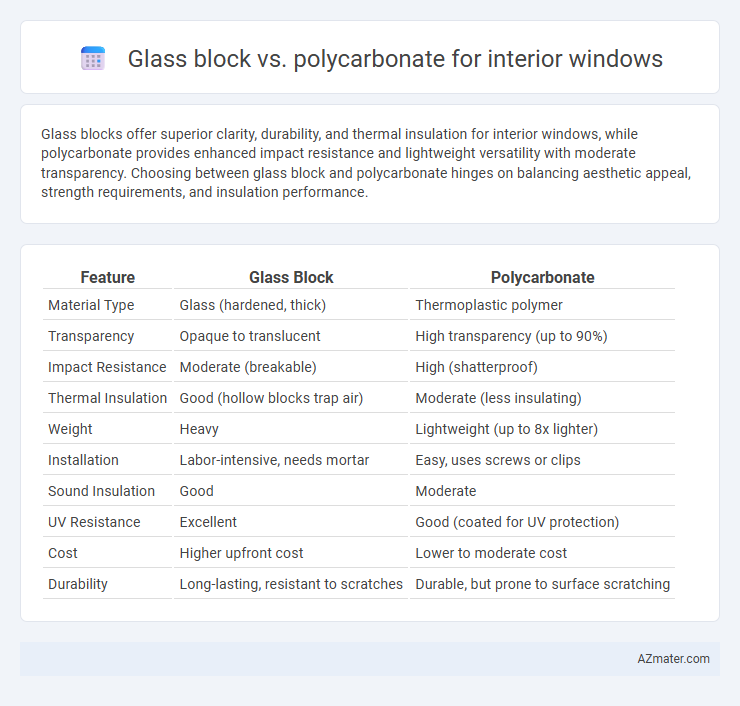Glass blocks offer superior clarity, durability, and thermal insulation for interior windows, while polycarbonate provides enhanced impact resistance and lightweight versatility with moderate transparency. Choosing between glass block and polycarbonate hinges on balancing aesthetic appeal, strength requirements, and insulation performance.
Table of Comparison
| Feature | Glass Block | Polycarbonate |
|---|---|---|
| Material Type | Glass (hardened, thick) | Thermoplastic polymer |
| Transparency | Opaque to translucent | High transparency (up to 90%) |
| Impact Resistance | Moderate (breakable) | High (shatterproof) |
| Thermal Insulation | Good (hollow blocks trap air) | Moderate (less insulating) |
| Weight | Heavy | Lightweight (up to 8x lighter) |
| Installation | Labor-intensive, needs mortar | Easy, uses screws or clips |
| Sound Insulation | Good | Moderate |
| UV Resistance | Excellent | Good (coated for UV protection) |
| Cost | Higher upfront cost | Lower to moderate cost |
| Durability | Long-lasting, resistant to scratches | Durable, but prone to surface scratching |
Introduction: Glass Block vs Polycarbonate for Interior Windows
Glass block offers superior durability and a distinctive aesthetic with its textured surface that diffuses light while maintaining privacy, making it ideal for interior windows requiring both strength and style. Polycarbonate panels provide exceptional impact resistance and lightweight flexibility, allowing for easier installation and enhanced safety in high-traffic interior areas. Both materials deliver unique benefits in light transmission and insulation, influencing their suitability based on specific interior design and functional requirements.
Material Composition and Structure
Glass blocks are composed of thick, solid glass panels that provide excellent sound insulation and durability, making them ideal for interior windows requiring privacy and natural light diffusion. Polycarbonate panels, made from lightweight, impact-resistant thermoplastic polymers, offer superior flexibility and shatter resistance compared to glass, enhancing safety in high-traffic areas. The cellular or multiwall structure of polycarbonate improves thermal insulation but generally lacks the aesthetic clarity and weight of traditional glass blocks.
Visual Aesthetics and Design Options
Glass blocks offer a classic, textured appearance with a variety of patterns and translucency levels, enhancing natural light diffusion and privacy in interior windows. Polycarbonate panels provide a sleek, modern look with customizable colors, textures, and transparency, allowing for versatile design integration and increased impact resistance. Both materials support unique aesthetic choices, but polycarbonate offers greater flexibility in design innovation and weight reduction.
Light Transmission and Privacy
Glass blocks provide high light transmission with a textured surface that diffuses light, maintaining privacy while allowing natural illumination. Polycarbonate panels offer excellent clarity and impact resistance but often require tinting or frosting treatments to enhance privacy. Both materials balance light transmission and privacy differently, with glass blocks favoring diffused natural light and polycarbonate offering customizable opacity levels.
Insulation and Energy Efficiency
Glass blocks provide superior thermal insulation due to their thick, solid structure that minimizes heat transfer, enhancing energy efficiency in interior window applications. Polycarbonate, while lightweight and impact-resistant, has lower insulation properties, often requiring additional treatments or layers to achieve similar energy-saving performance. Choosing glass block improves temperature regulation and reduces heating and cooling costs, making it a preferred material for energy-conscious interior designs.
Durability and Impact Resistance
Polycarbonate interior windows outperform glass blocks in durability due to their superior resistance to cracking and shattering under impact. Glass blocks, while sturdy and providing excellent insulation, are more prone to chipping and breaking when subjected to strong forces. Polycarbonate's impact resistance rating is significantly higher, making it ideal for environments requiring safety and long-lasting performance.
Installation Process and Flexibility
Polycarbonate panels offer greater flexibility and ease of installation for interior windows compared to glass blocks, which require precise alignment and mortar setting. The lightweight nature of polycarbonate allows for quicker mounting with simple framing techniques, reducing labor time and effort. Glass blocks provide a rigid, durable structure but demand more time-consuming installation and limited adaptability for custom shapes or adjustments.
Maintenance and Cleaning Requirements
Glass blocks require minimal maintenance, resisting scratches and stains while needing only regular cleaning with mild soap and water to maintain clarity. Polycarbonate panels demand more frequent cleaning due to their susceptibility to scratches and yellowing over time, often requiring protective coatings or specific non-abrasive cleaning agents. Both materials benefit from avoiding harsh chemicals, but glass blocks offer a longer-lasting, low-maintenance solution for interior window applications.
Cost Comparison and Value
Glass blocks typically cost between $20 to $30 per square foot, offering durability, sound insulation, and aesthetic appeal for interior windows. Polycarbonate panels range from $10 to $25 per square foot, providing impact resistance and lightweight properties but may lack the same level of thermal insulation and visual clarity. Considering long-term value, glass blocks often justify their higher initial cost through enhanced longevity and energy efficiency, while polycarbonate is a more budget-friendly option suitable for less permanent or utility-focused installations.
Best Applications: Choosing the Right Material for Your Space
Glass blocks offer excellent sound insulation and durability, making them ideal for bathrooms, stairwells, and decorative partitions where privacy and light transmission are key. Polycarbonate panels provide superior impact resistance and lightweight flexibility, suited for high-traffic areas, offices, or spaces requiring enhanced safety and quick installation. Selecting the right material depends on prioritizing factors like durability, safety, light diffusion, and aesthetic preference to optimize interior window performance.

Infographic: Glass block vs Polycarbonate for Interior window
 azmater.com
azmater.com